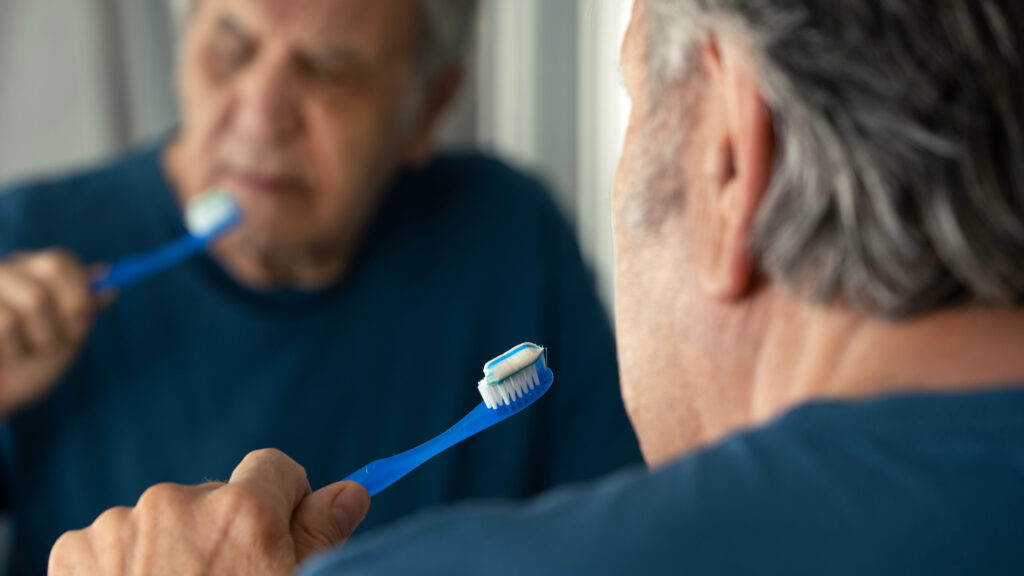Living with Parkinson’s disease often means adapting to new routines and challenges. These also include those challenges that are related to oral health. Parkinson’s disease can affect motor skills, muscle control, and even saliva production. All of these are crucial for maintaining a healthy mouth. Without proper care, Parkinson’s patients may face a higher risk of cavities, gum disease, and other oral health issues. But with the right strategies, tools, and awareness, dental care can be seamlessly incorporated into daily life, supporting overall well-being.

Parkinson’s disease is a neurological condition that affects the motor functions of the brain. The disease is characterized by both motor and non-motor symptoms. These symptoms develop when the brain loses its ability to produce sufficient amounts of dopamine, a neurotransmitter responsible for controlling movements of the body.
Parkinson’s disease impacts the oral health of patients in several ways, both directly and indirectly. Motor symptoms, such as tremors and rigidity, can make everyday tasks like brushing and flossing challenging. Non-motor symptoms, including dry mouth and swallowing difficulties, also contribute to oral health issues. For instance, reduced saliva production is a common problem in Parkinson’s disease. This can lead to dry mouth, which significantly increases the risk of cavities and gum disease.
Medications used to manage Parkinson’s symptoms can sometimes have side effects that affect oral health. For example, anticholinergic medications often cause dry mouth or changes in taste. If not addressed properly, these problems can make it difficult for the patient to adopt proactive and consistent dental care habits.
Challenges in maintaining oral hygiene
Maintaining a consistent oral hygiene routine can be difficult for Parkinson’s patients. This is mainly due to fatigue and reduced mobility.
The physical effort required for tasks like brushing, flossing, or even standing at the sink for extended periods can be overwhelming, especially when energy levels are low. As Parkinson’s disease progresses, these challenges often intensify. In advanced stages, tremor and muscle stiffness may make it difficult to hold a toothbrush steadily or maneuver it effectively around the teeth and gums. Even the seemingly simple act of opening the mouth wide enough for thorough brushing or dental procedures can become a major problem due to jaw stiffness and reduced motor control.
These difficulties can lead to lapses in oral care. This increases the risk of issues such as plaque buildup, gum disease, and tooth decay. For some patients, the fear of discomfort or embarrassment may even deter regular dental visits, further worsening oral health challenges. Recognizing these problems is crucial because it allows Parkinson’s patients, caregivers, and healthcare providers to implement tailored strategies.
Related post: Five Unique Tips for a Better Life with Parkinson’s Disease
Practical tips for maintaining oral health
Taking care of teeth and gums doesn’t have to be overwhelming, even with Parkinson’s disease. By making small adjustments and using the right tools, Parkinson’s patients can maintain effective oral hygiene and reduce the risk of complications.
Here are some of the key strategies Parkinson’s patients should consider:
1. Adapt brushing and flossing techniques:
- Switch to an electric toothbrush with a wide, easy-to-grip handle. These brushes can clean teeth more effectively with less manual effort.
- Use floss picks or water flossers, which are easier to handle than traditional floss. These tools make reaching between teeth simpler, even with limited dexterity.
2. Use assistive tools:
- Try attaching a non-slip grip, like a tennis ball or foam tubing, to toothbrush handle for better control.
- Use long-handled dental mirrors and tongue cleaners to help inspect and clean areas that may be hard to reach.
3. Hydrate and combat dry mouth:
- Dry mouth is common in Parkinson’s disease. This problem can be alleviated by sipping water throughout the day.
- Use over-the-counter dry mouth sprays, gels, or rinses to keep the mouth moist.
- Chewing sugar-free gum or candies can stimulate saliva production and reduce the risk of cavities.
4. Work with caregivers:
- If you have a caregiver, involve them in your oral care routine. Caregivers can assist with brushing, flossing, and ensuring that dental hygiene stays consistent.
- Use angled brushes or dual-handled tools designed for caregiver-assisted cleaning.
5. Make dietary adjustments:
- Avoid sticky sweets, sodas, and acidic foods like citrus fruits, which can erode tooth enamel.
- Opt for sugar-free alternatives and beverages to reduce the risk of cavities.
- Include foods high in calcium and vitamin D, such as dairy products, leafy greens, and fortified cereals, to strengthen teeth and bones.
- Drink plenty of water to combat dry mouth and to rinse away food particles and bacteria. Consider incorporating fluoridated water into your routine to strengthen tooth enamel.
When to seek dentist help?
Parkinson’s patients are recommended to seek immediate dental care if they observe the following signs:
- Persistent bad breath or a bad taste in your mouth.
- Swollen, red, or bleeding gums.
- Loose teeth or changes in your bite.
- Difficulty chewing or speaking due to dental discomfort.
Dentists experienced with Parkinson’s patients can manage these issues with minimal discomfort, using techniques and tools designed to accommodate patient’s specific needs.
Conclusion
Oral health is an integral part of overall well-being, especially for Parkinson’s patients. By understanding the unique challenges Parkinson’s disease presents and adopting tailored strategies, it’s possible to maintain a healthy mouth and prevent complications. Whether it’s through adaptive tools, dietary changes, or regular dental visits, these steps can make dental care more manageable and effective.
